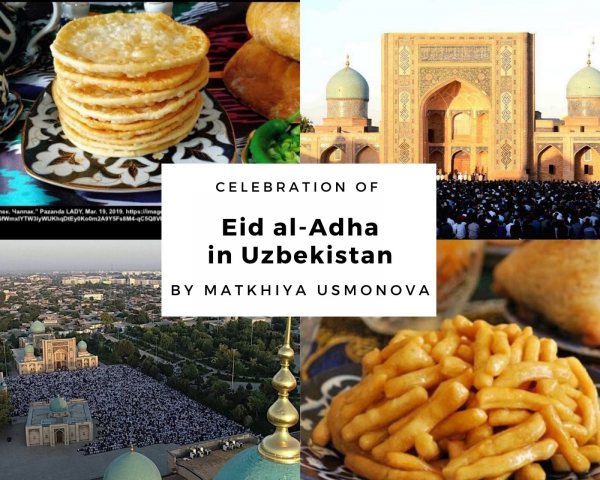
July 2020
This month's voice:
Matkhiya Usmonova, "Celebration of Eid al-Adha in Uzbekistan"
Introduction
By Lindsay Herron
Co-editor, KOTESOL Voices
When we created KOTESOL Voices, we wanted to showcase the manifold diverse voices in KOTESOL—the amazing prism of brilliant, divergent, and interweaving perspectives that shape who we are as an organization and inflect our attitudes, interactions, and understandings. This month, I am thrilled to spotlight one of our international student members, Matkhiya ("Mati") Usmonova. Mati has been an active participant in the Gwangju-Jeonnam Chapter of KOTESOL for a few years now, contributing her positive energy and charming smile not only to KOTESOL but also to the entire Gwangju community. I'm always delighted to see her around the city, whether she's volunteering, chatting with friends, or even performing traditional dances from her home country, Uzbekistan.
Mati's narrative below shares glimpses into her traditional celebrations during Eid al-Adha, a three-day holiday happening at the end of July this year. The coronavirus pandemic has forced changes to certain traditions in her hometown, while Mati, like many of us, also faces the perennial challenge of translating cherished local traditions to her current environs here in Korea. What is a traditional holiday like for a KOTESOL student member far from home, celebrating in a university dorm room during a pandemic? Well, if the enthusiasm and pride shining through in Mati's clear voice is any indication, she'll surely overcome all hindrances to celebrate the holiday in a personally meaningful way. Happy reading, and Eid Murabak to all who celebrate!
Celebration of Eid al-Adha in Uzbekistan
by Matkhiya Usmonova
Eid al-Adha's experience is unique in Uzbekistan this year! Do you know why?
First of all, let me explain Eid al-Adha briefly. It is an Islamic event to memorialize the willingness of Ibrahim, also known as Abraham, to follow Allah’s command to sacrifice his son. Not only Muslims in Uzbekistan but also Muslims all around the world celebrate this religious event by making a special effort to pray and listen to a sermon at a local mosque.
This year, Eid al-Adha will be celebrated from Thursday, July 30, to Monday, August 3, to remember Ibrahim’s (Abraham’s) loyalty and obedience to Allah (God) above all others. As you can see, the holiday lasts for three days. At this time in Uzbek mahalla (neighborhoods), you can see many children, mostly little girls, who go from house to house in a crowd, admiring well-dressed newly married wives, and they are treated to sweets. Also during the days of Eid al-Adha, it is recommended to visit and take care of the elderly and the sick and to carry out the tradition of felicitations on Eid. Most interestingly, people may symbolically sacrifice an animal (a sheep or a goat) in an act known as Qurbani (sacrifice). This stands for the animal that Ibrahim sacrificed in the place of his son. Actually, in Uzbekistan, families mostly buy a sheep to sacrifice, but I am not sure whether that is common among Muslims in England, Australia, or America. People in my country also give the meat of sacrificed animals to their poor neighbors. Sometimes they may give money to poorer members of their local community, too. Eid al-Adha is a public holiday in Uzbekistan, and I have heard that this is true in Malaysia, Turkey, and Indonesia, too. On these holiday days, we do not go to our workplaces or schools, and most businesses are closed, which gives us a chance to be with our family members or friends.
This year, due to the current pandemic situation, the Eid al-Adha prayer is not allowed to be performed in mosques. People have to pray at home. It is also important to say that before the pandemic in the period of Eid al-Adha, in Uzbekistan, some Muslims traveled to Mecca and the surrounding areas in Saudi Arabia to perform the Hajj pilgrimage. But one thing I should mention here is that going to Mecca is not easy for a majority of people even without a pandemic because it requires a big amount of money, so many Uzbek Muslims need to plan and save for many years to be able to take part in this event.
Living in Korea, we Muslim girls during Eid al-Adha pray five times a day and prepare some traditional sweets (such as the chalpak and chak chak in the photo at the top of the page) and share them. As for Muslim men, they usually go to local mosques to pray starting in the morning. I think celebrating Eid events in Korea is very convenient for us; but on the other hand, it is a bit sad not to be near our family members on such special days.
About the Author
Matkhiya Usmonova is from the Republic of Uzbekistan. Presently, she is a student at Chonnam National University in Gwangju, majoring in English Language and Literature. In addition to her studies, she does volunteering programs at the KONA Storybook Center, the Gwangju Children's Home, UNESCO, and the Gwangju News. She habitually strives to improve herself personally and educationally and tries to learn from her own mistakes. With all her heart, she is quite grateful for her meaningful, loving life.


